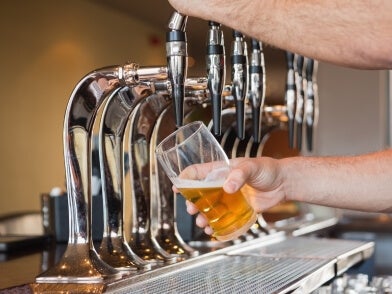Getting back in the habit
Neil Morgan, Managing Director, Pubs & Restaurants, explains why it's not all doom and gloom for the small publican.
Business. Built around You.
Your expert business property advisers

The modern small freeholder has a right old time of trying to make a business work. If it isn’t the effect of cheap supermarket booze offers, then it’s the Sky+ create-your-own culture that encourages people to stay at home with a bottle of wine and watching a TV schedule they created.
And then we have the question of where future customers will come from. The Millennial approach to a social life and conversation involves a smart phone, an iPad and takes place predominantly online, not in person. The Beautiful South’s Paul Heaton said in March that he feared his kids would never understand the concept of going to the pub and having a pint and a chat with friends rather than going out just to get “hammered”. It’s easy to see his point.
Last year, Scotland dramatically reduced the level of alcohol after which you could legally drive, and there is talk of bringing in similar restrictions across the rest of the UK. A recent survey by Christie & Co showed that nearly 80% of licensees in Scotland felt that this restriction had had a negative effect on their business, so surely a similar law in England and Wales would lead to more people choosing to stay at home rather than going out for a drink?
Simply put, we’ve got out of the habit of going to the pub.
If you believe everything you read, you’d think that the freehouse sector was on its last legs, and that the future of the publican lay in the realm of the pubco and the tenanted lease structure. Let’s face it, the freehouse publican has been pretty much to hell and back over recent years, and yet they not only survive, but have often even thrived in incredibly difficult conditions.
However, we’ve seen a slowdown in the trend of pubs being bought and recycled into retail or residential usage. In 2015, 84% of all the pubs that Christie & Co sold were retained for pub usage, the highest level recorded for five years, and we’ve also seen fewer distressed assets coming to the market.
The Budget of March 2016 gave the publican a further ray of sunlight. In cutting Stamp Duty thresholds, the Chancellor has made it easier for a prospective publican to purchase a pub, even giving an example of a sale within his speech. A person buying a £270,000 pub will now save in the region of £5,000 in Stamp Duty, making buying a pub a more attractive proposition, particularly for first-time licensees or those seeking to purchase a second site.
The cuts to business rates, due to come into effect on 1st April 2017, will mean that many small businesses will become exempt, with the threshold more than doubling for those eligible to pay from £6,000 to £15,000. This will be a significant saving for many independent bar and pub owners and may also help cover the extra cost which comes with the increase in National Living Wage, effective from 1st April 2016. This is a welcome move for many small businesses which were concerned about the rise in staffing costs.
The accommodation and food offerings of local pubs have increased dramatically over recent years. Long-gone are the days when a curled up sandwich with free housefly, served from underneath a net on the bar, or a packet of pork scratchings were the only way to line the stomach before a pint.
The freehouse publican has diversified in ways that larger pubcos and multiple operators haven’t been able to. They have adapted to the use of technology, they have tailored their marketing to the tastes of their potential customers and are more minded to bring a sense of community to the local pub. These pubs are a hive of local social activity with everyone from the bridge league to the local “stitch and bitch” group meeting in the village pub. And, of course, children are welcome.
The challenge for the individual publican in the coming years will be how to get people through the door. If licensees can get people back into the habit of going to the pub, then the “local boozer” will thrive despite all that stands in its way.